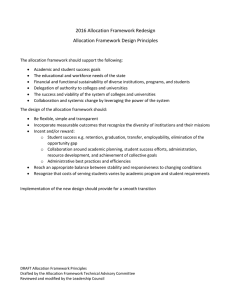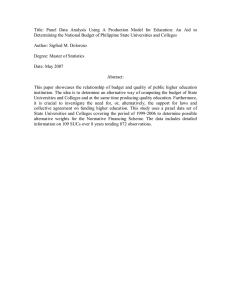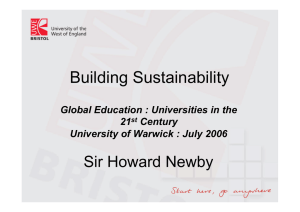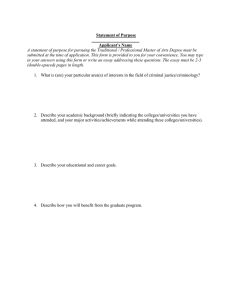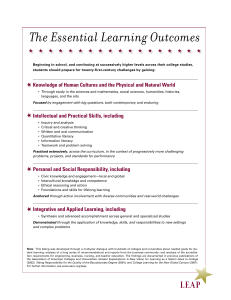ACMRHE 2015: Multidisciplinary Research in Higher Education
advertisement
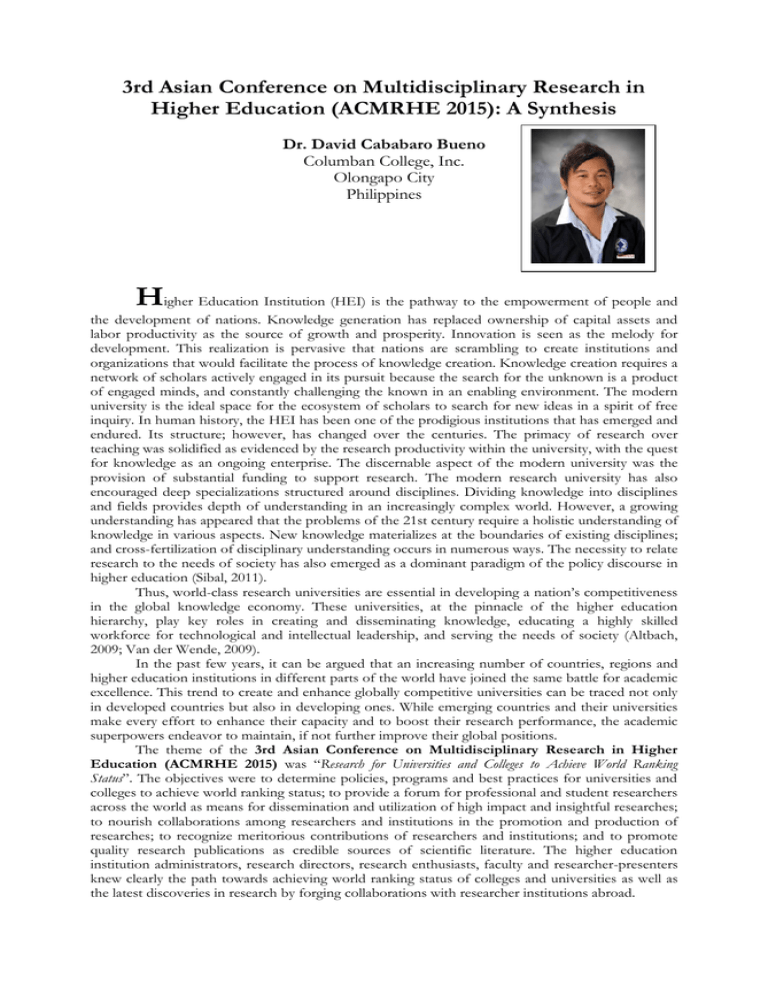
3rd Asian Conference on Multidisciplinary Research in Higher Education (ACMRHE 2015): A Synthesis Dr. David Cababaro Bueno Columban College, Inc. Olongapo City Philippines Higher Education Institution (HEI) is the pathway to the empowerment of people and the development of nations. Knowledge generation has replaced ownership of capital assets and labor productivity as the source of growth and prosperity. Innovation is seen as the melody for development. This realization is pervasive that nations are scrambling to create institutions and organizations that would facilitate the process of knowledge creation. Knowledge creation requires a network of scholars actively engaged in its pursuit because the search for the unknown is a product of engaged minds, and constantly challenging the known in an enabling environment. The modern university is the ideal space for the ecosystem of scholars to search for new ideas in a spirit of free inquiry. In human history, the HEI has been one of the prodigious institutions that has emerged and endured. Its structure; however, has changed over the centuries. The primacy of research over teaching was solidified as evidenced by the research productivity within the university, with the quest for knowledge as an ongoing enterprise. The discernable aspect of the modern university was the provision of substantial funding to support research. The modern research university has also encouraged deep specializations structured around disciplines. Dividing knowledge into disciplines and fields provides depth of understanding in an increasingly complex world. However, a growing understanding has appeared that the problems of the 21st century require a holistic understanding of knowledge in various aspects. New knowledge materializes at the boundaries of existing disciplines; and cross-fertilization of disciplinary understanding occurs in numerous ways. The necessity to relate research to the needs of society has also emerged as a dominant paradigm of the policy discourse in higher education (Sibal, 2011). Thus, world-class research universities are essential in developing a nation’s competitiveness in the global knowledge economy. These universities, at the pinnacle of the higher education hierarchy, play key roles in creating and disseminating knowledge, educating a highly skilled workforce for technological and intellectual leadership, and serving the needs of society (Altbach, 2009; Van der Wende, 2009). In the past few years, it can be argued that an increasing number of countries, regions and higher education institutions in different parts of the world have joined the same battle for academic excellence. This trend to create and enhance globally competitive universities can be traced not only in developed countries but also in developing ones. While emerging countries and their universities make every effort to enhance their capacity and to boost their research performance, the academic superpowers endeavor to maintain, if not further improve their global positions. The theme of the 3rd Asian Conference on Multidisciplinary Research in Higher Education (ACMRHE 2015) was “Research for Universities and Colleges to Achieve World Ranking Status”. The objectives were to determine policies, programs and best practices for universities and colleges to achieve world ranking status; to provide a forum for professional and student researchers across the world as means for dissemination and utilization of high impact and insightful researches; to nourish collaborations among researchers and institutions in the promotion and production of researches; to recognize meritorious contributions of researchers and institutions; and to promote quality research publications as credible sources of scientific literature. The higher education institution administrators, research directors, research enthusiasts, faculty and researcher-presenters knew clearly the path towards achieving world ranking status of colleges and universities as well as the latest discoveries in research by forging collaborations with researcher institutions abroad. A number of papers were focused on Education, such as academic, financial and psychological factors affecting maritime graduates, internalization of college core values among stakeholders, predictive academic regulation and emotion on academic resiliency, organizational climate as a correlate of lifelong service of teachers, the rhetoric appeals of marketing communications for operations initiatives, student’s satisfaction towards library services, implementation of Anti-sexual Harassment Act in school, 21st century instructional leadership skills vis-à-vis school culture, school climate and performance of elementary schools, student learning outcomes in professional courses in HRM program, and cruise line services qualities preferred by the shipping industry in maritime education. Sociolinguistics, language anxiety and mother tongue were likewise presented and discussed relative to gender differences, MT-BL of instruction in learning English grammar, Sinurigao: Morphology, Syntax, Phenology, Semantic, and English language anxiety in relation to productive competency of agriculture students in the Philippines. Social sciences and management in the light of cognitive and political maturity, coping and emotion-focused outcomes, constitutional history and political dynamics, teenage fathers stories, experiences on religious depiction of Lenten season, experiencing Hajj, stress and social support, child abuse and child protection laws, politics and deviant workplace behavior, archeological findings and waste characterization and quantification, employee’s in-role and extra-job performance towards affective commitment and trust, competition laws among the ASEAN countries, and organizational fairness and performance among employees were also talked about. On the area of food science and technology, various research enthusiasts focused on the study of anthocyanins in Bignay Berries, fermentation of fish viscera to fish sauce, enhancement of agar yield, development of multi-system automotive engine, and combined mechanical and hydraulic valve spring compressor. Lastly, a single paper on the Silva’s management competency theory: a classical factor-item analytic approach utilizing oblique rotation direct oblimin method was also unveiled. CONGRATULATIONS!
